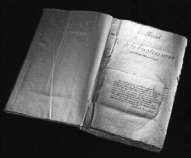 Within the plot are episodes and images, which, if they do not improve the unity of the novel, effectively carry out Rizal's purposes in writing it. The scene in the cockpit sarcastically portrays the humiliating effects of the passion for gambling. The vivid All Soul's Day dialogue of the Tertiaries on the gaining of indulgence is an unforgettable condemnation of fanaticism and superstition. The fiesta sermon of Fray Damaso, eloquently protests against the vulgar ignorance and hypocritical religious tyranny of the friars.
Within the plot are episodes and images, which, if they do not improve the unity of the novel, effectively carry out Rizal's purposes in writing it. The scene in the cockpit sarcastically portrays the humiliating effects of the passion for gambling. The vivid All Soul's Day dialogue of the Tertiaries on the gaining of indulgence is an unforgettable condemnation of fanaticism and superstition. The fiesta sermon of Fray Damaso, eloquently protests against the vulgar ignorance and hypocritical religious tyranny of the friars.
In these episodes perhaps, rather than in the novel as a whole, lie the book's power. The ultimate message is not always clearly spelled out, but the abuses and defects of the colonial regime are explicitly revealed. The discussions of Elias and Ibarra disclose possible solutions, and though Rizal is careful not to go for revolution, the threat is unmistakable if radical reforms are not forthcoming.
Rizal's book persistently unmasks contemporary Spaniards in the Philippines of every kind. The corruption and brutality of the civil guard drive good men to outlawry rather than reduce banditry. The administration crawls with self-seekers, out to make their fortune at the expense of the Filipinos, so that the few officials who are honest and sincere are unable to overcome the treacherous workings of the system, and their efforts to help the country often end up in frustration or in self-ruin.
The friars have made the Catholic religion an instrument for enriching and perpetuating themselves in power by seeking to mire ignorant Filipinos in fanaticism and superstition instead of teaching them true Catholicism, by controlling the government, by opposing all progress and by persecuting the Filipino ilustrado, unless they make themselves their servile flatterers.
Rizal does not, however, spare his fellow countrymen. The superstitious and hypocritical fanaticism of many who consider themselves religious people, the ignorance, corruption, and brutality of the Filipino civil guards, the passion for gambling unchecked by the thought of duty and responsibility, the servility of the wealthy Filipino towards friars and government officials, the ridiculous efforts of Filipinos to dissociate themselves from their fellowmen or to lord it over them -- all these are ridiculed in the novel. Nevertheless, Rizal clearly implies that many of these failings are traceable to association with the Spaniard, or to the misguided policy of the government and the questionable practices of the friars.
Yet, Rizal balances the national portrait by highlighting the virtues and good qualities of the unspoiled Filipino: the modesty and devotion of the Filipino woman, the unstinting hospitality of the Filipino family, the devotion of parents to their children and children to their parents, the deep sense of gratitude, the solid common sense of the untutored Filipino peasant.
The Noli is, therefore, not merely an attack on the Spanish colonial regime; it is a charter of nationalism. It calls on the Filipino to recover his self-confidence, to appreciate his own worth, to return to the heritage of his ancestors, to assert himself as the equal of the Spaniard. It insists on the need of education, of dedication to the country, of absorbing aspects of foreign cultures that would enhance the native traditions.
synopsis
characters
[back to top]
[noli me tangere]
[el filibusterismo]
[his masterpieces]











